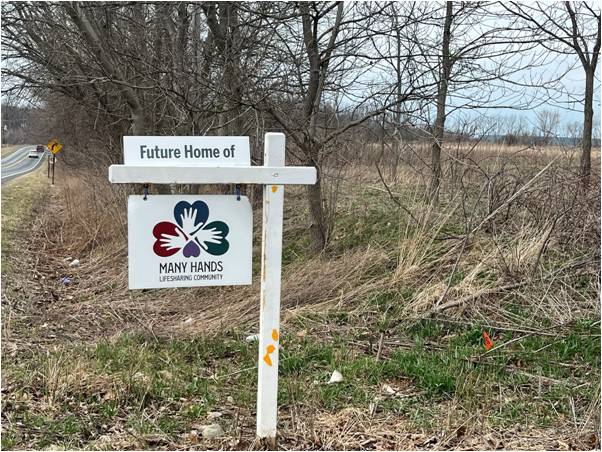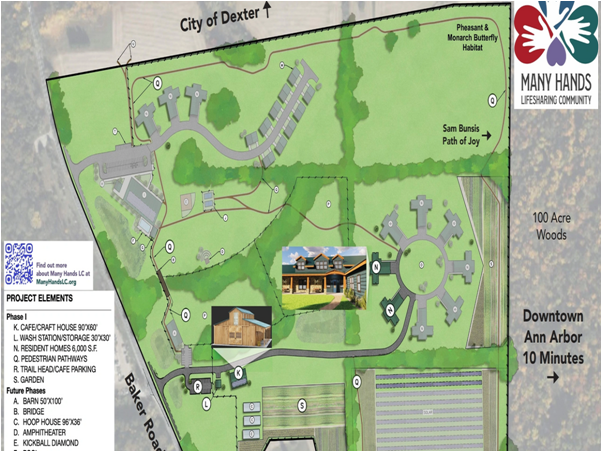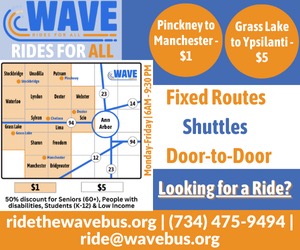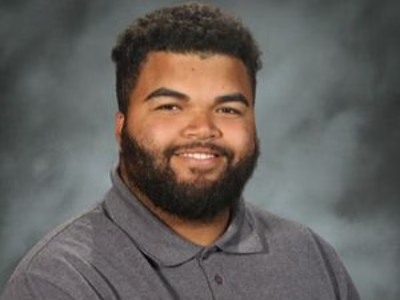There’s a big need in Washtenaw County that the planners of the Many Hands Lifesharing Community hope to help address with their development.
They estimate around 7,000 people in the county have Intellectual and/or Developmental Disabilities (IDD) with at least 1,000 of them being of adult age with parents who are aging. These individuals, their parents/guardians, and their family and friends are who they want to help.
The plan for the Many Hand Lifesharing Community recently took a big step toward it becoming a reality when it received a planning approval by the Scio Township Board of Trustees. The development is proposed to be constructed just outside of Dexter on Baker Road.
A Big Need
Its mission statement is to provide a safe, meaningful, connected life filled with enriching activities and learning opportunities for adults with intellectual and developmental disabilities, all within a cooperative residential setting that prepares the next generation of service professionals.
It began in 2005, when Many Hands’ Founder/Executive Director Kerry Kafafian realized her then 8-year-old son, who has an IDD, would always need round-the-clock direct care the rest of his life.
Kafafian said she asked herself then, “what are we going to do?” and “who will take care of my son when I no longer can?”
She said she then looked for an answer and began researching the best model of housing and care available for him. After 18 years of research, including travel to other states, she said that a farm-based Lifesharing model would be a place where her son could thrive. However, there wasn’t really something fully like this in Michigan. The closest model, to what she is thinking is for Many Hands, is in Holland, Michigan called Benjamin’s Hope, which is a farmstead community designed to connect adults with developmental and intellectual differences to the larger west Michigan community.
This led her to want to create and establish a place that could serve Washtenaw County and beyond. In April 2019, Kafafian said she reached out to other parents of children with intellectual and developmental disabilities, including autism, and together they decided to create a new housing community in Washtenaw County based on the Lifesharing model.
The Plan
The site that’s been chosen is 90 acres in size with two points of access to Baker Road. According to the project narrative, “the proposed project includes rezoning the site to PUD: Planned Unit Development to allow for development of a community for adults with intellectual and developmental disabilities to live with their caretakers.”
Proposed improvements include construction of the following: 11 resident homes; 10 duplex cottage homes; a 20,000 square feet (s.f.) community center; a 1,225 s.f. café and meeting space; a 5,400 s.f. craft house; a 5,000 s.f. barn with farm animals and pasture areas; crop fields, hoop houses, and supporting agricultural structures; recreational facilities for residents (pool, pavilion, pickleball courts, kickball diamond, amphitheater); pedestrian pathways; and a solar field. The supporting infrastructure, including driveways, parking areas, wells, wastewater/septic systems and storm water management facilities, will also be constructed.

Kafafian said at the core of what they want to do is provide the basic needs (food, housing, etc) for their residents and caretakers. She said at their heart they will be helping people survive.
The caretakers are big part of the plan. Kafafian said during her research she learned that caretakers are often overlooked as far as wages and with their own needs, such as housing. If the caretakers are well cared for than it’s more likely the residents in need will be to.
At full capacity, the development will be compromised of 175 people of all ages, living full-time on site. The residents (adults with a disability) will represent one third of the 175 people. The caretakers, or PALs (Professional Advocate Lifesharers) are individuals who seek experience working in the disability community and will live with the residents as families in the community’s 11 homes. Each residence will accommodate 12 people, including four adults with disabilities and eight caretakers.
“Many Hands Lifesharing Community will aim to be an innovative way to care for some of the most vulnerable in our society,” Kafafian said.
“Lifesharing” at Many Hands is defined as an environment where staff and individuals with a disability choose to live, grow and support one another.
Moving Forward
The next steps include officially purchasing the property, which Kafafian said they hope to do this month or next. They continue to look for help and are raising funds, through community members, foundations and from whoever wants to lend a hand.
The total project is estimated to cost $35 million. However, it would be built in phases, as funding becomes available. The first phase is estimated to cost $10 million and it would see the construction of two of the eight homes, the community craft house and the entire infrastructure. The Craft House, which will open to all, will have woodworking, clay, painting, and weavery areas for creative activities
They want to begin phase 1 in September.
On its webpage, Many Hands says, “Your support is the solution to create a better world by providing an amazing place for everyone to live and learn regardless of ability. You can help create an innovative solution to the housing and service support issue for adults with intellectual and developmental disabilities, including autism. With Medicaid funds as the main source of the yearly operating budget, it will allow financial stability compared to fundraising annually. Therefore the combination of Medicaid and Lifesharing is a cost effective model while providing a high level of care.”
To learn more about Many Hands Lifesharing Community and how you can help, go to https://manyhandslc.org/home. You can email or call Kerry@ManyHandsLC.org or 734-355-0991.





 8123 Main St Suite 200 Dexter, MI 48130
8123 Main St Suite 200 Dexter, MI 48130


